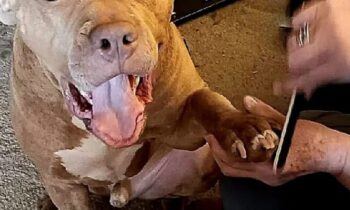
The conversation began, ironically, on a Facebook post about National Rescue Dog Day. I’d responded to a comment from a person I’ve known in real life for many years. I’d added the thought that not all “rescue” situations are equal: disreputable “rescues” can turn out to be mere scams. To follow up with my friend, I offered a link to an article that I’d written about questions to ask first when dealing with an animal rescue organization. My friend answered privately, in some distress.
She’d adopted a dog recently from an animal shelter local to her, and she was upset. I knew the backstory: she’s a person who has had a dog or dogs in her home for most of her adult life. Not long ago, her only dog, after a long spell of painful physical challenges, had been euthanized. She’d known right away that she did not want to live without a dog. She’d started looking for a “rescue” dog immediately. When she did find a dog, all the information provided to her turned out to be in error.
She told me, “With the dog I just adopted, I have to say it was . . . unfair to the dog and unfair to anyone looking to adopt her. [They] listed her wrong. She is not one bit good with other dogs and is not good really with people. She is very likely to bite, and if she were around other animals that would be a disaster in short order. I don’t know where they got the idea she was good around other animals. I thought it would be good to let her play with [a relative’s dog]. I didn’t do that, because [neither of us] would have been strong enough to have separated the fight had it happened. I am glad it never did happen, but had I gone by the way they presented her, she was going to be just fine with other dogs. Someone would likely have been hurt/bit, as well as vet bills and maybe even a dog’s life in jeopardy.”
My friend is very conflicted. She adopted a dog; she wanted to give that dog a good home. But based on the information provided to her through the adoption process, my friend now has a dog in that good home—a dog she can’t take to visit her family, a dog she can’t have around her friends’ and family’s dogs, a dog she probably can’t have even around her friends! She can already see that her life will have to work around keeping her family, friends, and other animals safe from her new dog. That is not what she’d imagined. She cannot be happy about a joyful future with a fighting/biting dog.
My advice was abrupt but, I believe, not unwise. I suggested that my friend return the dog immediately to the organization from which she’d adopted it. I noted, as she had, the potential liability she’s taken on: she could end up with veterinary bills for her dog and for other animals injured by her dog; she could end up with medical bills for humans who might try to “break up” fights. Plus, of course, there is the possibility that her dog could injure other dogs or humans so severely that they’d require lifelong care or worse. Her dog could be responsible for ending the life of another dog.

Photo by Erin Saywell
The dog my friend adopted had been, she believes, misrepresented by the organization offering the adoption. The specific errors on the dog’s adoption profile (that the dog was “good” with other dogs and with people) put my friend in a horrible position. Remaining the legal owner of the dog—whatever remedies my friend may seek to keep herself, other humans, and other animals safe—means she is liable for whatever the dog’s behavior may cause. She will pay the bills. She will have to live with the knowledge that her dog could hurt or kill another dog or a human.
I don’t think my friend “deserves” that heartbreak in her future.
What will she decide? I know she cares about the dog already; that’s who she is. I know she will feel some sense of failure if she cannot resolve the dog’s issues with other animals and people. I also know that, from what she’s said about the dog’s behavior, those issues may never be resolved so thoroughly that my friend and her friends and family would feel safe around her dog.
I don’t want that for her. I want better for her . . . and for the dog.
For the organization that allowed her to adopt this dog with an inaccurate assessment of the dog’s temperament and behavior, I wish a very big change.
Here’s a link to my article about adopting from an animal rescue—ask these questions first:
https://www.fox28spokane.com/adopting-from-an-animal-rescue-ask-these-questions-first/
After consulting folks I know who’ve worked with animal rescues, I’d like to add one extremely important suggestion:
Read the adoption contract.
Reputable rescues ask adopters to sign a contract before the adoption is approved. Read that contract thoroughly. Look for what you, as an adopter, will be legally required to do if you cannot keep the dog. In almost every case, a reputable rescue will ask you to sign a legal agreement that, if you cannot keep the dog, you will return it to the rescue. That’s the bottom line. If the “rescue” won’t take the dog back because it doesn’t work out for you, it’s not a “rescue”—it may well be a scam.
I found out one local rescue in the area where I live was a scam when a neighbor asked me for advice about a newly-adopted dog that had already bitten several humans. Not light nips—bites.
My neighbor is a senior with grandchildren who visit often.
She’d called the rescue in distress, knowing the danger this dog had brought into her family’s life.
The response she got?
Nope, no, nada—the rescue wouldn’t take the dog back.
Of course not!
My neighbor felt horrible, but what could she do? She could not keep the dog and still be sure her family would be safe. She knew that she’d been scammed. She did take the dog to a veterinarian who fully supported her feeling that the dog could simply not continue as her family’s pet—or as anybody’s family pet. The dog was humanely euthanized, at my neighbor’s expense.
When I am asked to recommend reputable rescues in my area, there’s one I know now never to recommend: the “rescue” that wouldn’t take back my neighbor’s dog. It’s not a rescue; it’s a scam.
If a rescue won’t take a dog back, it’s not a “rescue.” It’s a scam.
NEXT WEEK: How you can do a “reality check” on a dog’s adoption profile to determine for yourself if the information about the dog sounds credible and correct.



